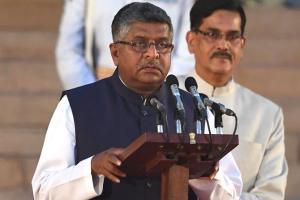Years later, Prasad was the lead lawyer in the Public Interest Litigation against the former Bihar chief minister in the fodder scam case

Ravi Shankar Prasad
New Delhi/Patna: From a counsel holding the brief for the deity 'Ram Lalla' in the Ayodhya title suit to a moderniser spearheading the 'Digital India' initiative and clamping down on contentious practices like instant triple talaq, BJP leader Ravi Shankar Prasad has worn many hats. Winning his maiden election against colleague-turned opponent Shatrughan Sinha from Patna Sahib seat in Bihar by more than 2.84 lakh votes, 65-year-old Prasad is among the few BJP leaders who have been a minister in every NDA government that came to power at the Centre in last two decades. Hailing from an RSS background, the lawyer-turned-politician rubbed shoulders with Gandhian-Socialists during Emergency, sharing a jail cell with Lalu Prasad Yadav. The two were office bearers in the Patna University students union during the turbulent 1970s but they later ideologically drifted apart. Years later, Prasad was the lead lawyer in the Public Interest Litigation against the former Bihar chief minister in the fodder scam case.
ADVERTISEMENT
Prasad continued to practice law and politics in the BJP, rising to fame as one of the junior ministers in the Atal Bihari Vajpayee Cabinet. He was Minister of State in the departments of Coal and Mine and Law and Justice. But his most memorable stint was as the Information and Broadcasting minister when he initiated reforms in the radio, television and animation sectors. When Modi first swept to power in 2014, he was first given the ministries of telecom and information technology and electronics. Later, he was divested of the telecom portfolio. He held the portfolios of law and justice as well as electronics in the outgoing government. In Modi 2.0 government, he has again become a Cabinet minister. Prasad sworn in as Cabinet minister Thursday. In the first stint under Modi, the government's flagship Digital India programme was implemented under his watch and drove several initiatives to galvanise electronics and mobile handset manufacturing in the country. Mobile phone manufacturing units in India increased to 120 in 2018 from just 2 in 2014. In the same period, annual production of mobile handsets increased from 60 million units to 225 million units, creating one lakh direct jobs.
He spearheaded programmes for setting up BPO (Business Process Outsourcing) units in smaller towns and cities, and steered the growth of Common Service Centres (CSCs) -- government's rural outreach network for delivery of digital services as well as the new electronics policy that aims to create a USD 400 billion electronic manufacturing ecosystem by 2025, and a separate policy for software to position India as a hub for product development. An ardent social media user with over 3.2 million followers on Twitter did not stop him from taking a firm stand against social media giants like Facebook and WhatsApp on issues of fake news, data privacy, and election integrity, and has led the charge on draft data protection legislation and tightening of social media rules. Born to Thakur Prasad, a late Bihar minister and one of the tallest Jana Sangh leaders in the state, Prasad was associated with the Akhil Bharatiya Vidyarthi Parishad, the RSS' students wing since 1970s when he was a student at the Patna University from where he did his M.A. and L.L.B. Prasad became a member of the BJP national executive in 1995 and was elected to the Rajya Sabha five years later.
The then Prime Minister Atal Bihari Vajpayee appointed him the Minister of State for Information and Broadcasting with independent charge. His tenure is remembered for the introduction of the Conditional Access System of satellite TV channels which is said to have dealt a body blow to unhealthy trade practices of cable TV operators. In the decade during which the BJP-led NDA remained out of power and the country was ruled by Congress-headed UPA, Prasad remained one of the most forceful spokespersons for his party. He represented 'Ram Lalla', one of the three petitioners in the Ayodhya title suit which was decided in September 2010 by the Allahabad High Court which ordered that the disputed site be equally distributed among the claimants the others being the Nirmohi Akhara and the Sunni Waqf Board. After Narendra Modi's ascension to power in 2014, Prasad was made a cabinet minister with important portfolios like Law and Justice and Electronics and IT. His tenure was marked by initiatives like a successful auction of telecom spectrum the allocation of which was mired in corruption scandals under the previous UPA dispensation, scrapping of over 100 obsolete laws, and the judicial crackdown on instant triple talaq notwithstanding reservations voiced by the opposition as well as BJP allies. Under his watch, efforts were made to streamline judicial work through measures like installation of video conferencing facilities at courts and appointment of NyayMitras for faster disposal of pending cases. He was serving his fourth consecutive term in the Rajya Sabha, to which he was re-elected only last year, before making a surprise Lok Sabha debut in the recent general elections.
Catch up on all the latest Crime, National, International and Hatke news here. Also download the new mid-day Android and iOS apps to get latest updates
 Subscribe today by clicking the link and stay updated with the latest news!" Click here!
Subscribe today by clicking the link and stay updated with the latest news!" Click here!






